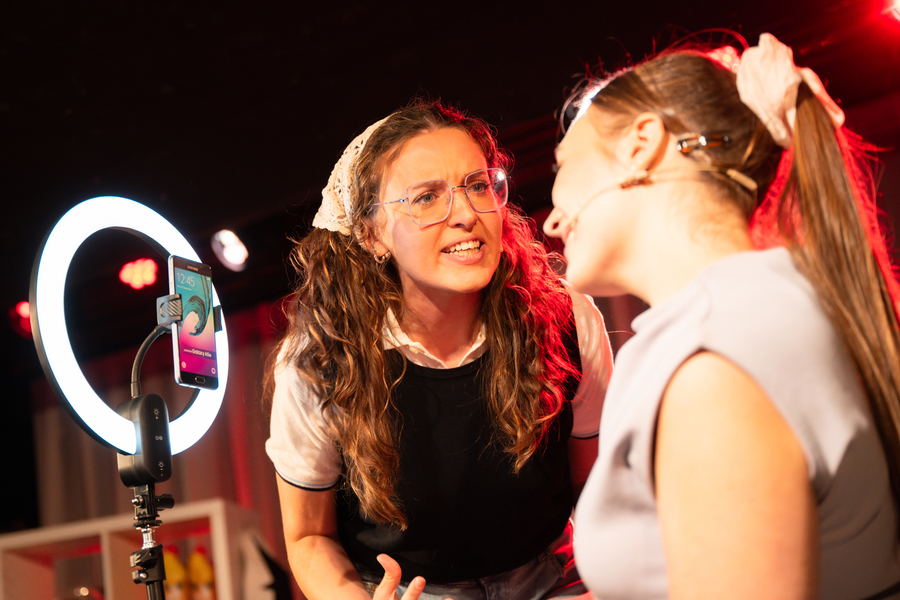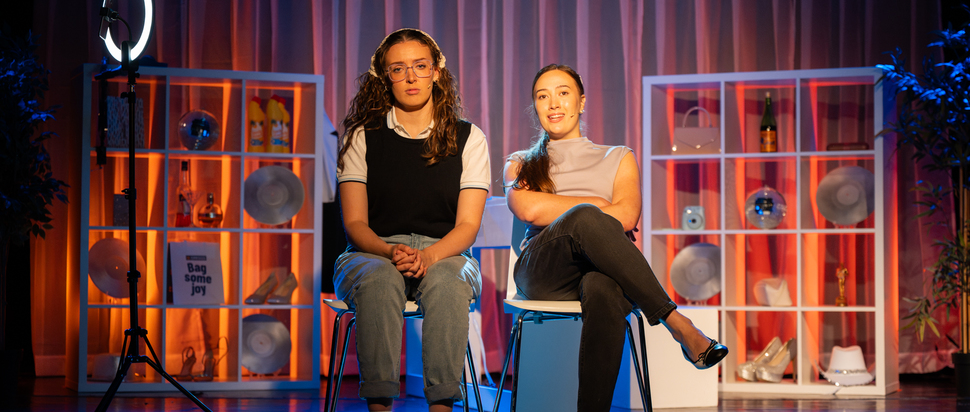Meme Girls @ Òran Mór, Glasgow
Despite knockout performances by its stars, this one act musical alienates its own subjects
Meme Girls, Play Pie Pint's recent offering by seasoned playwright Andy McGregor, concluded its week-long run at Òran Mór last week. The musical, which starred Yana Harris and Julia Murray, chronicled the rise and fall of a best friendship between two young women pursuing musical stardom, or virality, or both.
As a hook, the title 'Meme Girls' suggests a witty romp steeped in internet culture, or maybe a piece referential of the famous media property on which it's a pun. What the show is, in reality, is more akin to what grown-up writers think kids want from the internet. It's about girls, yes. And it's about social media, sort of (memes, though, not so much). Direct, wary, and at times condescending toward its subjects, the construction of the script itself speaks to the fear that social media has impacted our relationship to art, childhood and friendship. What the script misses is a substantial comment on how social media actually impacts adolescents and what we, as a community, can do about it.

Meme Girls production photo by Tommy Ga-Ken Wan
In Meme Girls, two besties, Clare and Jade, attempt to start a band (or, rather, go viral on TikTok and then be in a famous band), but their plans quickly go awry when one friend goes viral for what the other feels are the wrong reasons. The rift that explodes between them was present the whole time (the show only has an hour, so there's no harm done by brevity), and the two girls go their separate ways: one becomes a low-brow 'influencer', and one becomes 'normal'.
My primary gripe with the project is its apparent distrust of its own subjects. As the viral friend, Clare is treated with sympathy but not empathy. We know that social media particularly harms young girls; we know that the social landscape teenagers are facing right now is difficult; we know, as the script insists, that "content is king". These concepts aren't new to those of us who actually engage with these eponymous memes, or to those of us who are (or have been) teen girls. In short, it isn't enough to point to social media and say that it's poisoning the minds of our children. This sort of hand-wringing, navel-gazing moralisation fell short of both impact and entertainment. Where questions could have been asked about our relationship to art and creativity, collaboration and friendship, loneliness and virality, the only throughline was the evening news fear that those damn phones are turning our kids into assholes. It was a story about and told by subjects that, somehow, seemed eclipsed and spoken over in their own narratives.
Despite what I would generously call an incomplete dramaturgical execution, the play was made nonetheless magical by the performances of its stars. With mere weeks to rehearse the musical, Murray and Harris played and sang beautifully, and their depictions of their characters at various stages of childhood and young adulthood were expertly rendered. At its high points, Meme Girls speaks to the profound loneliness that drives teenagers to seek validation online. Not every one-act musical has to be a profound comment on the state of humanity, but for a title that promises some sort of narrative about an issue that touches nearly all of our lives, Meme Girls attempts to critique the conditions that lead these girls down this path and, instead, ends up replicating them.
Run ended. For more info, go to playpiepint.com/plays/meme-girls/
